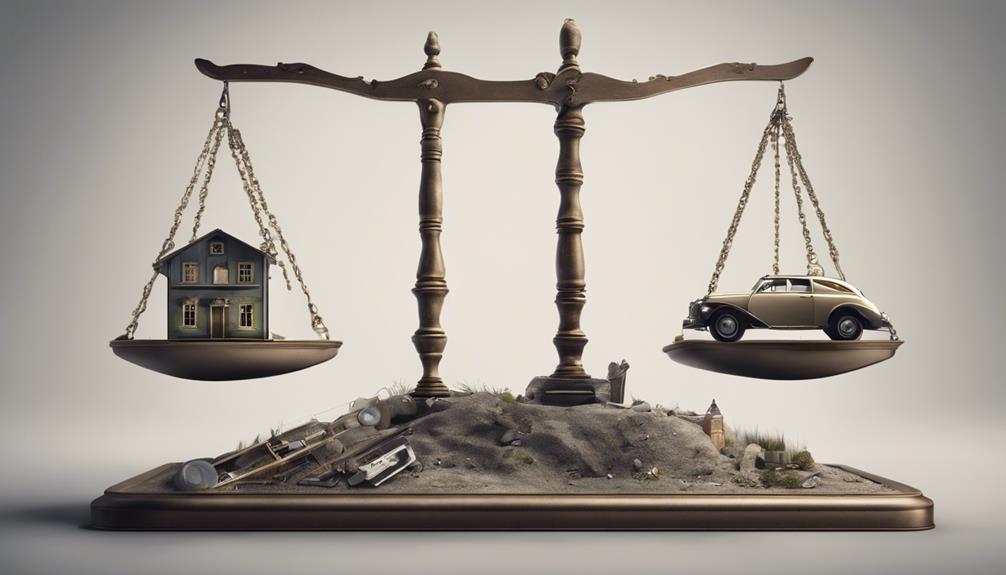Filing for bankruptcy during divorce can substantially affect how your assets are divided, often making the process more complicated. When a spouse files, a trustee may take control of assets, liquidate property, or enforce exemptions, which can reduce what’s available for division. The timing of your bankruptcy influences whether assets are protected or sold, and joint liabilities may remain or be discharged altogether. If you want to understand how these factors can impact your financial outcome, there’s more to think about.
Key Takeaways
- Filing for bankruptcy before divorce can simplify asset division by clearing debts and protecting certain assets through exemptions.
- Bankruptcy trustee gains control over the filing spouse’s assets, potentially liquidating property that affects overall marital resources.
- Post-divorce bankruptcy may complicate asset division if assets are claimed by the bankruptcy estate or liabilities are discharged.
- Joint debts may remain after bankruptcy, leaving the non-filing spouse responsible for liabilities, impacting asset and liability sharing.
- Timing of bankruptcy influences asset protection strategies and can either streamline or complicate the division process during divorce.

Have you ever wondered how financial struggles influence the course of divorce? It’s a question that affects many couples facing economic hardship, especially when bankruptcy enters the picture. Bankruptcy and divorce are both major life events, often intertwined, with statistics showing over a million personal bankruptcy filings and a similar number of divorces annually in the U.S. Financial distress is a leading cause of both, and money issues are frequently cited as the top source of arguments that lead to separation. More than half of people believe that a spouse’s debt is enough reason to consider divorce, illustrating how deeply financial instability can strain even the strongest relationships.
When bankruptcy occurs during divorce, it plays a critical role in how assets are divided. Typically, marital assets are pooled and divided between spouses, but bankruptcy introduces complexity into this process. If one spouse files for bankruptcy, the bankruptcy trustee gains control over that spouse’s assets. This means that some or all of their property may be sold or liquidated to satisfy creditors, which can substantially reduce the total assets available for division. The non-bankrupt spouse might find themselves with fewer resources, especially if the bankrupt spouse’s assets are substantial. Furthermore, exemptions allowed under bankruptcy law—such as homestead exemptions—vary by state but can influence how much property is protected versus liquidated, affecting the division process.
The timing of bankruptcy relative to divorce is essential because it impacts asset protection and liability allocation. Filing for bankruptcy before divorce can streamline asset division by clearing debts but complicates the process of dividing assets if the bankrupt spouse’s property is claimed by the bankruptcy estate. Conversely, if bankruptcy happens after divorce, the financial strain from post-divorce obligations, like alimony or child support, can push a spouse into bankruptcy, further impacting the marital estate. Changes in bankruptcy laws, such as the 2005 reforms, have made these decisions even more strategic, as filing at different times can alter the protection of assets and liabilities. Research indicates that filing for bankruptcy prior to divorce can sometimes help protect assets from division, but it also requires careful legal planning.
Bankruptcy’s influence on asset division isn’t limited to property alone. It also affects debts, which are often divided during divorce proceedings. A bankrupt spouse might have their debts discharged or reduced, but this can leave the other spouse responsible for joint liabilities. Overall, bankruptcy can complicate the division of assets, sometimes leaving one spouse with fewer resources and shifting the financial burden onto the other. Understanding how bankruptcy interacts with divorce can help you navigate these challenges more effectively, especially given how legal changes and state exemptions can influence the outcome.
Frequently Asked Questions
Can Bankruptcy Delay Divorce Proceedings?
Yes, bankruptcy can delay your divorce proceedings. When you file, an automatic stay pauses most legal actions, including asset division and debt settlement, often extending the timeline. If you file Chapter 7, this delay typically lasts three to six months, but Chapter 13 can prolong it up to five years. During this period, courts often wait for bankruptcy cases to resolve before finalizing divorce-related financial matters.
How Does Bankruptcy Impact Child Custody Arrangements?
Bankruptcy doesn’t directly impact your child custody arrangements. Courts decide custody based on the child’s best interests, separate from bankruptcy proceedings. However, if your financial hardship affects your ability to care for your child, it might influence custody decisions. You must continue paying child support even during bankruptcy, and custody can only be changed through a family court petition. Staying stable and meeting your child’s needs helps protect your custody rights.
Are Retirement Accounts Protected During Bankruptcy in Divorce?
Retirement accounts are generally protected during bankruptcy, with federal laws shielding accounts like 401(k)s and IRAs up to $1.5 million. You benefit from strong protections, especially if accounts stay within their designated retirement funds. However, if you withdraw or commingle those funds with other assets, protection can be lost. State laws may also offer additional safeguards, so it’s essential to understand your local regulations to make certain your retirement savings remain protected.
What Happens to Jointly Owned Assets in Bankruptcy During Divorce?
When bankruptcy occurs during divorce, your jointly owned assets usually become part of the bankruptcy estate, regardless of who owns them. If you’re the filing spouse, your interest may be liquidated or reorganized depending on the bankruptcy chapter. The trustee might seek to sell the entire property to satisfy debts, but your share should be protected. However, you could still be liable for joint debts, so consulting a legal expert is essential.
Does Bankruptcy Affect Alimony or Child Support Obligations?
Bankruptcy doesn’t eliminate your alimony or child support obligations. These are considered priority debts, so you must continue paying them regardless of your bankruptcy status. Filing for bankruptcy won’t stop enforcement actions like wage garnishments or court orders. If your circumstances change, family courts can modify support amounts, but your legal responsibility remains. Bankruptcy helps with other debts, but support obligations must be maintained despite your filing.
Conclusion
Steering bankruptcy during divorce forces you to balance hope with hardship, clarity with chaos. While the financial storm threatens to drown your assets, it also offers a chance to rebuild, to redefine your future. Just as the wreckage of debt contrasts with the promise of renewal, your journey becomes a declaration to resilience. Embrace the upheaval, knowing that amidst loss, there’s potential for new beginnings, turning your financial downfall into a foundation for growth.










